高三英语专项复习-动词时态
- 格式:doc
- 大小:30.00 KB
- 文档页数:8
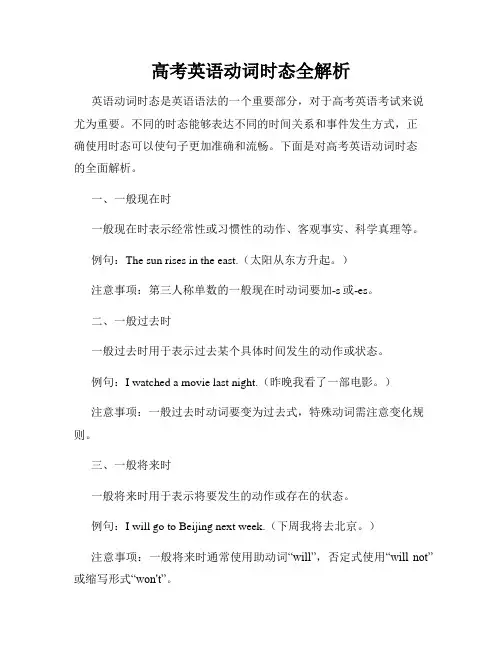
高考英语动词时态全解析英语动词时态是英语语法的一个重要部分,对于高考英语考试来说尤为重要。
不同的时态能够表达不同的时间关系和事件发生方式,正确使用时态可以使句子更加准确和流畅。
下面是对高考英语动词时态的全面解析。
一、一般现在时一般现在时表示经常性或习惯性的动作、客观事实、科学真理等。
例句:The sun rises in the east.(太阳从东方升起。
)注意事项:第三人称单数的一般现在时动词要加-s或-es。
二、一般过去时一般过去时用于表示过去某个具体时间发生的动作或状态。
例句:I watched a movie last night.(昨晚我看了一部电影。
)注意事项:一般过去时动词要变为过去式,特殊动词需注意变化规则。
三、一般将来时一般将来时用于表示将要发生的动作或存在的状态。
例句:I will go to Beijing next week.(下周我将去北京。
)注意事项:一般将来时通常使用助动词“will”,否定式使用“will not”或缩写形式“won't”。
四、现在进行时现在进行时表示现在正在进行的动作。
例句:He is studying in the library now.(他现在正在图书馆学习。
)注意事项:现在进行时要使用be动词的现在分词形式,同时注意第三人称单数的变化规则。
五、过去进行时过去进行时表示过去某个时间段内正在进行的动作。
例句:They were playing basketball yesterday afternoon.(昨天下午他们正在打篮球。
)注意事项:过去进行时要使用be动词的过去分词形式,同时注意第三人称单数的变化规则。
六、现在完成时现在完成时用于表示过去发生并与现在有关的动作或状态。
例句:I have finished my homework.(我已经完成了我的家庭作业。
)注意事项:现在完成时要使用助动词“have/has”,同时注意动词的过去分词形式。
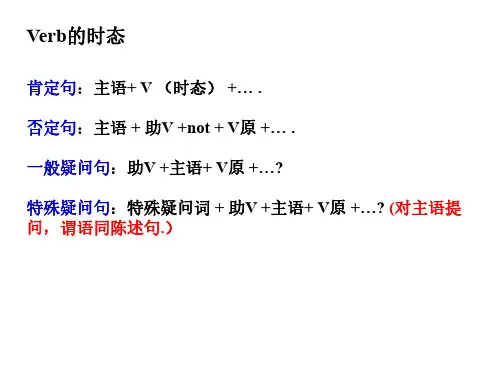
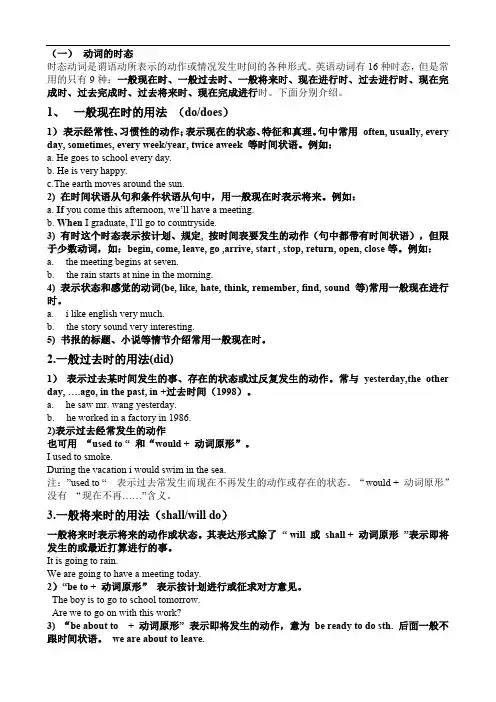
(一)动词的时态时态动词是谓语动所表示的动作或情况发生时间的各种形式。
英语动词有16种时态,但是常用的只有9种:一般现在时、一般过去时、一般将来时、现在进行时、过去进行时、现在完成时、过去完成时、过去将来时、现在完成进行时。
下面分别介绍。
1、一般现在时的用法(do/does)1)表示经常性、习惯性的动作;表示现在的状态、特征和真理。
句中常用often, usually, every day, sometimes, every week/year, twice aweek 等时间状语。
例如:a. He goes to school every day.b. He is very happy.c.The earth moves around the sun.2) 在时间状语从句和条件状语从句中,用一般现在时表示将来。
例如:a. If you come this afternoon, we’ll have a meeting.b. When I graduate, I’ll go to countryside.3) 有时这个时态表示按计划、规定, 按时间表要发生的动作(句中都带有时间状语),但限于少数动词,如:begin, come, leave, go ,arrive, start , stop, return, open, close等。
例如:a.the meeting begins at seven.b.the rain starts at nine in the morning.4) 表示状态和感觉的动词(be, like, hate, think, remember, find, sound 等)常用一般现在进行时。
a.i like english very much.b.the story sound very interesting.5) 书报的标题、小说等情节介绍常用一般现在时。
2.一般过去时的用法(did)1)表示过去某时间发生的事、存在的状态或过反复发生的动作。
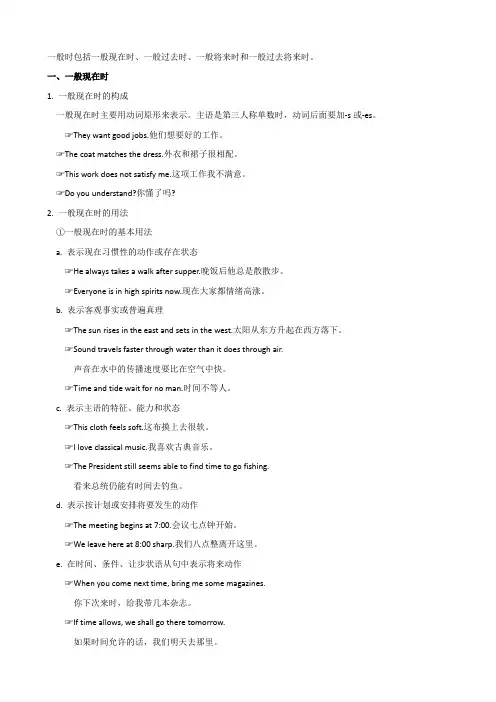
一般时包括一般现在时、一般过去时、一般将来时和一般过去将来时。
一、一般现在时1. 一般现在时的构成一般现在时主要用动词原形来表示。
主语是第三人称单数时,动词后面要加-s或-es。
☞They want good jobs.他们想要好的工作。
☞The coat matches the dress.外衣和裙子很相配。
☞This work does not satisfy me.这项工作我不满意。
☞Do you understand?你懂了吗?2. 一般现在时的用法①一般现在时的基本用法a. 表示现在习惯性的动作或存在状态☞He always takes a walk after supper.晚饭后他总是散散步。
☞Everyone is in high spirits now.现在大家都情绪高涨。
b. 表示客观事实或普遍真理☞The sun rises in the east and sets in the west.太阳从东方升起在西方落下。
☞Sound travels faster through water than it does through air.声音在水中的传播速度要比在空气中快。
☞Time and tide wait for no man.时间不等人。
c. 表示主语的特征、能力和状态☞This cloth feels soft.这布摸上去很软。
☞I love classical music.我喜欢古典音乐。
☞The President still seems able to find time to go fishing.看来总统仍能有时间去钓鱼。
d. 表示按计划或安排将要发生的动作☞The meeting begins at 7:00.会议七点钟开始。
☞We leave here at 8:00 sharp.我们八点整离开这里。
e. 在时间、条件、让步状语从句中表示将来动作☞When you come next time, bring me some magazines.你下次来时,给我带几本杂志。
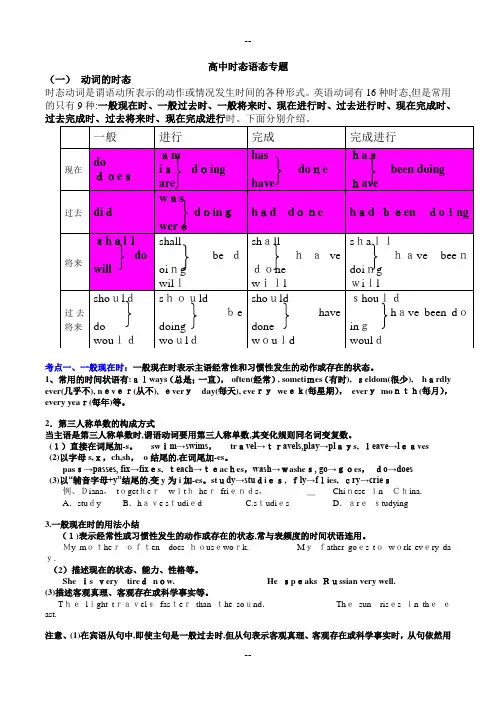
高中时态语态专题(一)动词的时态时态动词是谓语动所表示的动作或情况发生时间的各种形式。
英语动词有16种时态,但是常用的只有9种:一般现在时、一般过去时、一般将来时、现在进行时、过去进行时、现在完成时、考点一、一般现在时:一般现在时表示主语经常性和习惯性发生的动作或存在的状态。
1、常用的时间状语有:always(总是;一直),often(经常), sometimes(有时), seldom(很少),hardly ever(几乎不), never(从不), everyday(每天), everyweek(每星期),everymonth(每月),every year(每年)等。
2.第三人称单数的构成方式当主语是第三人称单数时,谓语动词要用第三人称单数,其变化规则同名词变复数。
(1)直接在词尾加-s。
swim→swims,travel→travels,play→plays, leave→leaves (2)以字母s,x,ch,sh,o结尾的,在词尾加-es。
pass→passes, fix→fixes, teach→teaches,wash→washes, go→goes,do→does(3)以“辅音字母+y”结尾的,变y为i加-es。
study→studies, fly→flies, cry→cries例、Diana,togetherwithherfriends,__________ Chinese inChina.A.study B.have studied C.studies D.arestudying3.一般现在时的用法小结(1)表示经常性或习惯性发生的动作或存在的状态,常与表频度的时间状语连用。
My motheroften does housework. Myfather goes towork every da y.(2)描述现在的状态、能力、性格等。
She is very tirednow. He speaks Russian very well.(3)描述客观真理、客观存在或科学事实等。
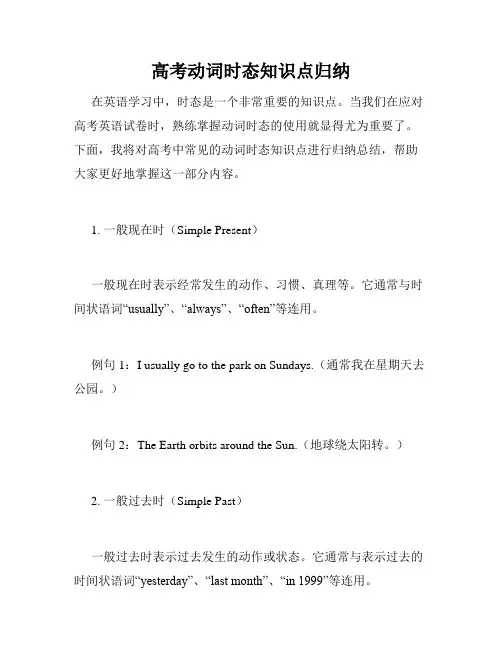
高考动词时态知识点归纳在英语学习中,时态是一个非常重要的知识点。
当我们在应对高考英语试卷时,熟练掌握动词时态的使用就显得尤为重要了。
下面,我将对高考中常见的动词时态知识点进行归纳总结,帮助大家更好地掌握这一部分内容。
1. 一般现在时(Simple Present)一般现在时表示经常发生的动作、习惯、真理等。
它通常与时间状语词“usually”、“always”、“often”等连用。
例句1:I usually go to the park on Sundays.(通常我在星期天去公园。
)例句2:The Earth orbits around the Sun.(地球绕太阳转。
)2. 一般过去时(Simple Past)一般过去时表示过去发生的动作或状态。
它通常与表示过去的时间状语词“yesterday”、“last month”、“in 1999”等连用。
例句1:I watched a movie last night.(昨晚我看了一部电影。
)例句2:They lived in London three years ago.(三年前他们住在伦敦。
)3. 现在进行时(Present Continuous)现在进行时表示现在正在进行的动作,经常与“now”、“at the moment”等时间状语连用。
例句1:She is studying at the library now.(她正在图书馆学习。
)例句2:I am having dinner with my family at the moment.(我现在正在和家人吃晚饭。
)4. 过去进行时(Past Continuous)过去进行时表示过去某个时间点正在进行的动作,常与表示过去的时间状语连用。
例句1:He was playing basketball with his friends yesterday afternoon.(昨天下午他正在和朋友们打篮球。
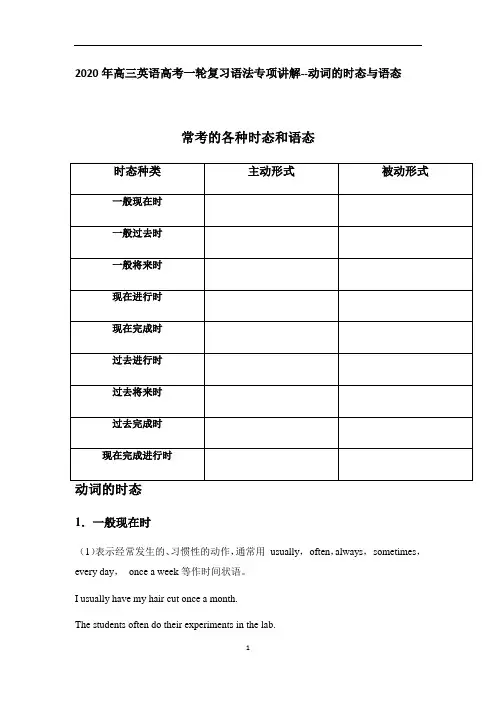
2020年高三英语高考一轮复习语法专项讲解--动词的时态与语态常考的各种时态和语态1.一般现在时(1)表示经常发生的、习惯性的动作,通常用usually,often,always,sometimes,every day,once a week等作时间状语。
I usually have my hair cut once a month.The students often do their experiments in the lab.(2)表示客观真理、格言以及不受时间限制的客观存在。
The earth moves around the sun.A bird in hand is worth two in the bush.(3)表示按时间表、计划、规定发生的动作。
The train leaves at 2: 35 this afternoon(4)在时间、条件、让步状语从句中代替一般将来时You will succeed if you try your best.Even if it rains tomorrow, the football match will take place.2.现在进行时(1)表示说话时正在进行的动作或存在的状态。
Our friends are waiting for us outside now(2)表示现阶段正在进行的作或及生的事情。
She is learning English at college.(3)某些短暂性动词,如come,go,start,open,arrive, return,begin,leave 等用于现在进行时,表示按计划、安排即将发生的动作。
My father is coming to see me this Saturday.He is leaving for Beijing next week.(4)某些动词的进行时表示慢慢地、渐渐地发生变化。
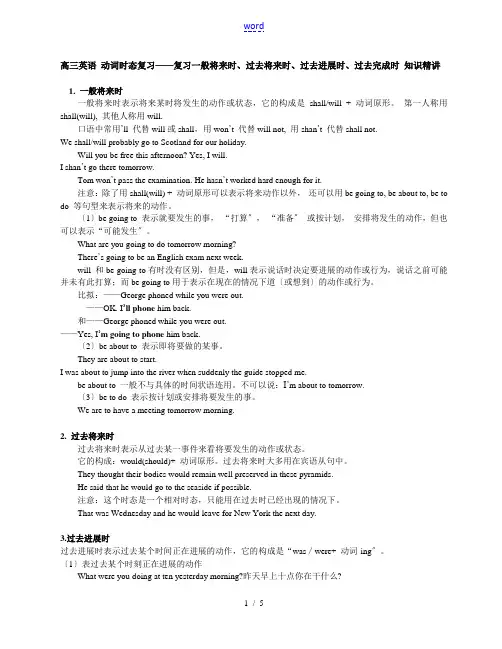
高三英语动词时态复习——复习一般将来时、过去将来时、过去进展时、过去完成时知识精讲1. 一般将来时一般将来时表示将来某时将发生的动作或状态,它的构成是shall/will + 动词原形。
第一人称用shall(will), 其他人称用will.口语中常用’ll 代替will或shall,用won’t 代替will not, 用shan’t 代替shall not.We shall/will probably go to Scotland for our holiday.Will you be free this afternoon? Yes, I will.I shan’t go there tomorrow.Tom won’t pass the examination. He hasn’t worked hard enough for it.注意:除了用shall(will) + 动词原形可以表示将来动作以外,还可以用be going to, be about to, be to do 等句型来表示将来的动作。
〔1〕be going to 表示就要发生的事,“打算〞,“准备〞或按计划,安排将发生的动作,但也可以表示“可能发生〞。
What are you going to do tomorrow morning?There’s going to be an English exam next week.will 和be going to有时没有区别,但是,will表示说话时决定要进展的动作或行为,说话之前可能并未有此打算;而be going to用于表示在现在的情况下道〔或想到〕的动作或行为。
比拟:——George phoned while you were out.——OK. I’ll phone him back.和——George phoned while you were out.——Yes, I’m going to phone him back.〔2〕be about to 表示即将要做的某事。
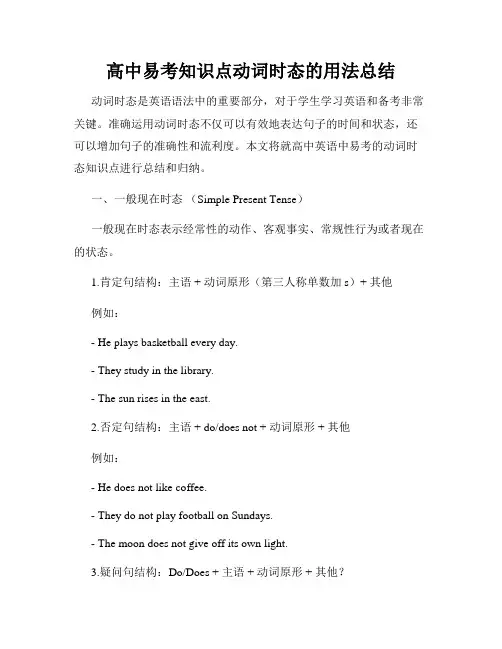
高中易考知识点动词时态的用法总结动词时态是英语语法中的重要部分,对于学生学习英语和备考非常关键。
准确运用动词时态不仅可以有效地表达句子的时间和状态,还可以增加句子的准确性和流利度。
本文将就高中英语中易考的动词时态知识点进行总结和归纳。
一、一般现在时态(Simple Present Tense)一般现在时态表示经常性的动作、客观事实、常规性行为或者现在的状态。
1.肯定句结构:主语 + 动词原形(第三人称单数加s)+ 其他例如:- He plays basketball every day.- They study in the library.- The sun rises in the east.2.否定句结构:主语 + do/does not + 动词原形 + 其他例如:- He does not like coffee.- They do not play football on Sundays.- The moon does not give off its own light.3.疑问句结构:Do/Does + 主语 + 动词原形 + 其他?例如:- Do you eat vegetables every day?- Does she live in London?- Do they speak English?二、一般过去时态(Simple Past Tense)一般过去时态表示过去某个时间发生的动作或者状态。
1.肯定句结构:主语 + 动词过去式 + 其他例如:- I played soccer yesterday.- She watched a movie with her friends.- They visited their grandparents last summer.2.否定句结构:主语 + did not + 动词原形 + 其他例如:- I did not study for the test.- She did not go to the party.- They did not see the performance.3.疑问句结构:Did + 主语 + 动词原形 + 其他?例如:- Did you finish your homework last night?- Did she arrive on time?- Did they eat dinner together?三、一般将来时态(Simple Future Tense)一般将来时态表示将来某个时间会发生的动作或者状态。
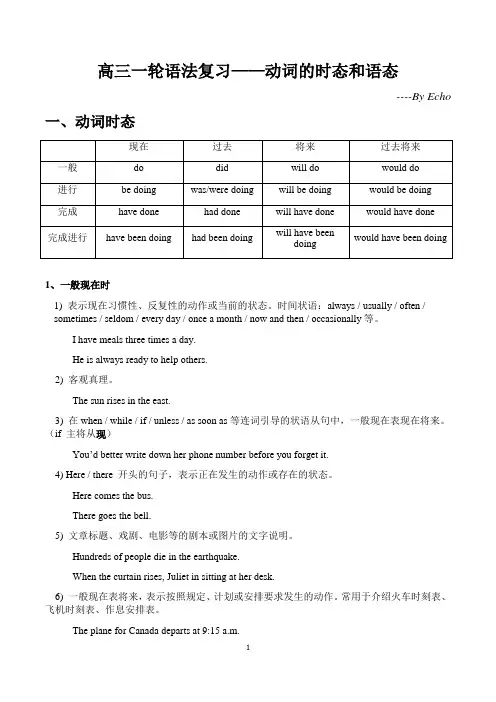
高三一轮语法复习——动词的时态和语态----By Echo 一、动词时态1、一般现在时1) 表示现在习惯性、反复性的动作或当前的状态。
时间状语:always / usually / often / sometimes / seldom / every day / once a month / now and then / occasionally等。
I have meals three times a day.He is always ready to help others.2) 客观真理。
The sun rises in the east.3) 在when / while / if / unless / as soon as等连词引导的状语从句中,一般现在表现在将来。
(if 主将从现)You’d better write down her phone number before you forget it.4) Here / there 开头的句子,表示正在发生的动作或存在的状态。
Here comes the bus.There goes the bell.5) 文章标题、戏剧、电影等的剧本或图片的文字说明。
Hundreds of people die in the earthquake.When the curtain rises, Juliet in sitting at her desk.6) 一般现在表将来,表示按照规定、计划或安排要求发生的动作。
常用于介绍火车时刻表、飞机时刻表、作息安排表。
The plane for Canada departs at 9:15 a.m.The programme ends at 11:10 p.m.2、一般过去时1)表示过去某个时间完成或一度存在的状态。
时间状语:then / yesterday / the other day / in 1990 / 5 years ago / last year等。
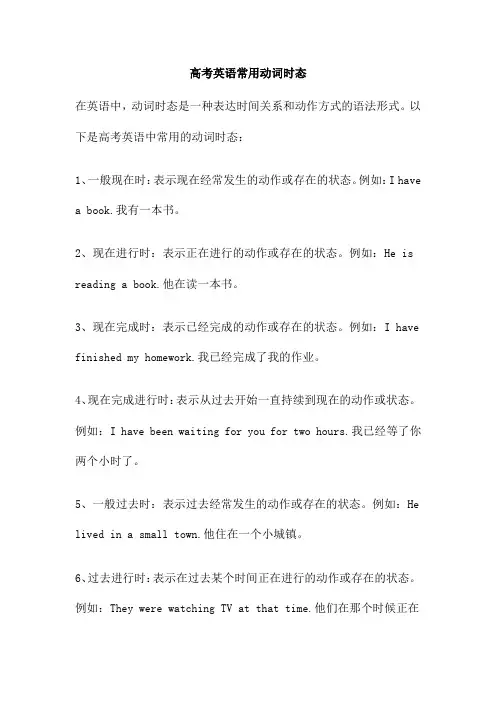
高考英语常用动词时态在英语中,动词时态是一种表达时间关系和动作方式的语法形式。
以下是高考英语中常用的动词时态:1、一般现在时:表示现在经常发生的动作或存在的状态。
例如:I havea book.我有一本书。
2、现在进行时:表示正在进行的动作或存在的状态。
例如:He is reading a book.他在读一本书。
3、现在完成时:表示已经完成的动作或存在的状态。
例如:I have finished my homework.我已经完成了我的作业。
4、现在完成进行时:表示从过去开始一直持续到现在的动作或状态。
例如:I have been waiting for you for two hours.我已经等了你两个小时了。
5、一般过去时:表示过去经常发生的动作或存在的状态。
例如:He lived in a small town.他住在一个小城镇。
6、过去进行时:表示在过去某个时间正在进行的动作或存在的状态。
例如:They were watching TV at that time.他们在那个时候正在看电视。
7、过去完成时:表示从过去某个时间开始一直持续到现在的动作或状态。
例如:He had worked in this company for five years before he left.他离开前在这家公司工作了五年。
8、一般将来时:表示将来经常发生的动作或存在的状态。
例如:I will go to school tomorrow.我明天要去上学。
9、将来进行时:表示将来某个时间正在进行的动作或存在的状态。
例如:They will be having a meeting tomorrow afternoon.他们明天下午将开会。
10、将来完成时:表示从将来某个时间开始一直持续到未来的动作或状态。
例如:He will have finished his homework by the end of this week.他将在这个周末之前完成他的作业。
高三英语的语法知识点汇总一、动词时态:动词的时态有现在时、过去时、将来时等。
它们用于表示不同的时间状态和动作发生的时间。
以下是高三英语常见的动词时态:1. 现在时态:现在时态用于表示目前的状态或经常性的动作。
常见的现在时态包括一般现在时、现在进行时和现在完成时。
- 一般现在时:表示经常性、习惯性的动作或客观真理等。
如:I eat breakfast every day.- 现在进行时:表示正在进行的动作。
如:She is studying forthe exam.- 现在完成时:表示过去发生的动作对现在造成的影响。
如:They have finished their work.2. 过去时态:过去时态用于表示过去发生的动作或状态。
常见的过去时态包括一般过去时、过去进行时和过去完成时。
- 一般过去时:表示过去某个时间内发生的动作或存在的状态。
如:He went to the park yesterday.- 过去进行时:表示过去某个时间点正在进行的动作。
如:I was watching TV when she called.- 过去完成时:表示过去某个时间点之前已经完成的动作。
如:They had left before I arrived.3. 将来时态:将来时态用于表示将来发生的动作或状态。
常见的将来时态包括一般将来时和将来进行时。
- 一般将来时:表示将来某个时间内发生的动作或存在的状态。
如:I will go to the party tomorrow.- 将来进行时:表示将来某个时间点正在进行的动作。
如:She will be studying when you arrive.二、动词语态:动词的语态有主动语态和被动语态。
主动语态表示主语是动作的执行者,而被动语态表示主语是动作的承受者。
1. 主动语态:主动语态的句子结构为“主语 + 动词 + 宾语”。
- The teacher teaches the students.(老师教学生。
高考英语语法专题动词时态动词时态(tense)就是一种动词形式,不同得时态用以表示不同时间里所产生得动作或存在得状态。
动词时态分类:1. 高考真题解析1、 Months ago we sailed ten thousand miles across this open sea, which ______ the Pacific, and we met no storms 、 (辽宁卷)A 、 was calledB 、 is calledC 、 had been calledD 、 has been called 2、 “What would you do if it _________tomorrow?” “We have to carry it on, since we’ve got everything ready 、” (全国卷I)A 、 rainB 、 rainsC 、 will rainD 、 is raining3、 As soon as he es back, I’ll tell him when _________and see him 、 (北京卷)A 、 you will eB 、 will you eC 、 you eD 、 do you e4、 “If the traffic hadn’t been so heavy, I could have been back by 6 o’cl ock 、” “What a pity! Tina _________ here to see you 、” (湖南卷)A 、 isB 、 wasC 、 would beD 、 has been5、—Is Peter ing?—No, he____ his mind after a phone call at the last minute 、(2015 重庆,1)A. changes B 、 changed C 、 was changing D 、 had changed 6、 “Did you tell Julia about the result?” “Oh, no, I forgot 、 I _________her now 、” (全国卷III)A 、 am going to call B、 will call C 、 call D 、 am to call7、 “What are you going to do this afternoon?” “I am going to the cinema with some friends 、 The film _________ quite early, so we _________ to the bookstore after that 、” (重庆卷)A 、 finished, are goingB 、 finished, goC 、 finishes, are goingD 、 finishes, go高考真题解析1、Listen to the two girls by the window、What language _________? (全国卷III)A、did they speakB、were they speakingC、are they speakingD、have they been speaking2、“Are you still busy?” “Yes, I _________ my work and it won’t take long、” (浙江卷)A、just finishB、am just finishingC、have just finishedD、am just going to finish3、Susan decided not t o work on the program at home because she didn’t want her parents to know what she _________、(辽宁卷)A、has doneB、had doneC、was doingD、is doing高考真题解析1、Years ago we didn’t know this, but recent science _________ that people who don’t sleep well soon get ill、(广东卷)A、showedB、has shownC、will showD、is showing2、He was hoping to go abroad but his parents _________ that they won’t support him unless he can borrow money from the bank、(湖北卷)A、were decidingB、have decidedC、decidedD、will decide3、My brother is an actor、He _________in several film so far、(浙江卷)A、appearsB、appearedC、has appearedD、is appearing4、The country life he was used to _________ greatly since 1992、(山东卷)A、changeB、has changedC、changingD、have changed5、In my hometown, there is always a harvest supper for the farmers after all the wheat____ cut、(2015 重庆,13)A、will have beenB、will beC、wasD、has been6、Our teacher told us that Columbus discovered America in 1492、He _________more than 5,000 English words when he entered the university at the age of 15、(北京卷)A、has learnedB、would have learnedC、learnedD、had learned7、When the old man _________ to walk back to his house, the sun _________ itself behind the mountain、(湖北卷)A、started; had already hiddenB、had started; had already hiddenC、had started; was hidingD、was starting; hid8、、Father _________for London on business upon my arrival, so I didn’t see him、(福建卷)A、has leftB、leftC、was leavingD、had left9、The policeman’s attention was suddenly caught by a small box which _________ placed under the Mi nister’s car、(广东卷)A、has beenB、was beingC、had beenD、would be10、“Hurry up! Alice and Sue are waiting for you at the school gate、” “Oh ! I thought they _________ without me、” (江西卷)A、wentB、are goingC、have goneD、had gone语法My best friend Kaiya is like me 、She _______(remind) me of myself 、In the past , I ______(be) never confident because of my appearance 、People always laughed at my weight , my weight , my hairstyle , etc 、At that time , I was the shortest student in my class 、I started getting depressed 、However , someone told me something that i will always remember 、It was in March 、Surrounded by a group of girls who _____(point) at me and laughed at me 、i couldn’t help crying 、The tears rolled down my face like a rushing river 、To my surprise , someone lifted my head up and wiped the tears from my eyes 、I then knew it was our English teacher , Miss Li 、She said , “You _____(be ) perfect the way you are 、You should never change or hate yourself 、People ______(accept ) you for who you are 、But if you cannot accept yourself , then how will other people accept you ?” I ________(inspire) by her words 、Over the past few months 、I_____________(learn) that no one is perfect and that we all have flaws 、Now , seeing Kaiya cry , I decide to tell her the same thing Miss Li _________(tell) me 、1、A:Hey, John 、_______ are you doing this weekend ?B: Not much , mark 、I don’t really have any plans yet 、A: ______ you ever been to the space museum?B: Yes , I have 、I ________(go) there last month 、A: Oh, how ____(be) it ?B: It was great 、I ________ been there many times 、A: I see 、I ______ never ________ there 、B: Well , let’s go this weekend then 、I don’t mind going again 、I thin k there’s something new there 、I ___________not see it last time 、2、A: Have you _______(seen ) the robots at the science museum ?B: Yes, I _______(go )there last weekend 、3、Let’s _______(spend) the day at the zoo 、Well , I’ve already _______ there a couple of times , but I’m happy _________(go) again 、4、Last year I _______(go) to the Hangzhou National Tea Museum 、5、It’s unbelievable the technology __________(progress) in such a rapid way !6、I went there once when I ______(be) 10 years old , but I ______ not been back since then 、7、I ______(visit) the Palace Museum three times 、9、There _____(be ) a sports meeting next week 、10、Linda ________(see) the movie many times , so she _______(not see) yesterday 、高考题1、Jack _____(work) in the lab when the power cut occurred 、2、Excuse me , which movie are you waiting for ?The new Star Wars 、We ________(wait ) here for more than 2 hours 、3、In the last few years , China ______(make ) great achievements in environment protection 、4、The sun was setting when my car ____ (break )down near a remote village 、5、People stepped on your feet or _________(push) you with their elbows , hurrying ahead to get to a bargain 、6、All the visitors to this village ________(treat) with kindness a week ago 、阅读下面短文,在空白处填入1个适当得单词或括号内单词得正确形式In 1863the first underground passenger railway in the world opened in London、It ran for just under seven kilometers and allowed people to avoid terrible __61__(crowd) on the roads above as they travelled to and ___62__ work、It took three years to plete and was built using an interesting method、This included digging up the road, ____63___(lay) thetrack and then building a strong roof over___64___ top、When all those had been done, the road surface was replaced、Steam engines ___65__(use) to pull the carriages and it must havebeen___66__(fair)unpleasant for the passengers, with all the smoke and noise、However, the railway quickly proved to be a great success and within six months, more than 25,000 people were using___67__ every day、Later, engineers ____68___(manage) to construct railways in a system of deep tunnels (隧道), which became known to the tube、This development was only possible with the___69___ (introduce) of electricpowered engines and lifts、The central London Railway was one of the most ___70___(success) of these new lines, and was opened in 1900、It had whitepainted tunnels and bright red carriages, and proved extremely popular with the public、。
高中英语知识点归纳动词的时态和语态动词是英语中最重要的词类之一,学好动词的时态和语态对于高中英语学习至关重要。
时态和语态在语法和意义上都有着重要的作用,它们可以帮助我们准确表达动作的发生时间以及动作的主体和客体关系。
本文将对动词的时态和语态进行归纳总结,帮助高中学生更好地掌握这一知识点。
一、动词的时态1. 一般现在时:表示经常性或普遍性的动作或状态。
结构为"主语 + 动词原形(第三人称单数形式加-s)"。
例句:She dances every Friday evening.2. 现在进行时:表示现阶段正在进行的动作。
结构为"主语 + be动词(am/is/are)+ 现在分词"。
例句:They are playing basketball now.3. 一般过去时:表示过去某个时间发生的动作或状态。
结构为"主语 + 动词过去式"。
例句:He studied English last night.4. 过去进行时:表示过去某一时刻的持续性动作。
结构为"主语 + was/were + 现在分词"。
例句:I was reading a book when she called me.5. 现在完成时:表示从过去某一时刻开始一直延续到现在的动作或状态。
结构为"主语 + have/has + 过去分词"。
例句:She has travelled to many countries.6. 过去完成时:表示过去某一时刻之前完成的动作。
结构为"主语 + had + 过去分词"。
例句:They had already left when I arrived.7. 将来时:表示将来某个时间会发生的动作或状态。
结构为"主语 + will/shall + 动词原形"。
例句:I will call you tomorrow.8. 过去将来时:表示过去某个时间之后会发生的动作或状态。
略谈高三英语专项复习:动词时态英语动词有16种时态,但是常见的只有9种:一般现在时、一般过去时、一般将来时、现在进行时、过去进行时、现在完成时、过去完成时、过去将来时、现在完成进行时。
(一)一般现在时(1)表示经常发生的动作、存在的状态或现阶段的习惯。
常用的状语有:often, sometimes, usually, every day等。
如:class begins at 8 o’ clock every morning.(2)表示不受时间限制的客观事实或普遍真理。
lighttravels faster than sound,the earth moves around the sun,表示格言或警句中。
pride goes before a fall,骄者必败。
注意:此用法如果出现在宾语从句中,即使主句是过去时,从句谓语也要用一般现在时。
例:columbus proved that tlie earth is round,,(3)表示按照计划、规定要发生的动作,句中都带有时间状语:(只限于是go,nome,leave,start,begin,stop,return,open,close等开始或移动意义的词。
)his plane leaves at 10:00,(4)在含时间和条件状语从句的复合句中。
the momenthe arrives,i’ll tell him about it.(5)在含宾语从句的复合句中。
the children were told inthe physics class that the moon moves round the sun,(6)图片说明、电影说明、解说戏剧内容及场景。
(7)在某些到装句中,用一般现在时表示现在正在发生的动作。
look out!here comes a bus,(二)一般过去时1)表示过去的动作或状态。
2)表示过去一段时间内经常发生的动作。
3)叙述过去连续发生的事情。
常与表示过去的时间状语连用,如:the other day,iastsunday /week,iust now(刚才),then,in the past,at that time,lastnight,yesterday,an heur ago,the other day,the year before last,{n1982等以及由连词when等引导的时间状语从句。
it was theother day that t met him,he got hurt when he landed on the ground,(1)句型.it is time for sb,to do sth”到……时间了””该……一了”it is time sb,did sth,it is time for you to go to bed,你该睡觉了。
it is time you went to bed,你早该睡觉了。
(2)wish,wonder,think,hope等用过去时,作试探性的询问、请求、建议等。
i thought you might have some,我以为你想要一些。
比较:一般过去时表示的动作或状态都已成为过去,现已不复存在。
(3)mrs,darby lived in kentncky for seven years.(含义:达比太太已不再住在肯塔基州。
)mrs,darby has lived in kentucky for seven years;(含义:现在还住在肯塔基州,有可能指刚离去)(3)注意:用过去时表示现在,表示委婉语气。
动词want,hope,wonder,think,intend等。
did you want anything else?1 wondered if you could helo me.(4)used to/be used toused to+do:”过去常常”表示过去习惯性的动作或状态,但如今已不存在。
mother used not to be so forgetful,tom used to take a walk,(过去常常散步)be usedto+doing:对……已感到习惯,或”习惯于”,to是介词,后需加名词或动名词。
he{s used to a vegetarian diet,tom is used to taking a walk,(现在习惯于散步)典型例题——your phone number again?i——quite catch il——it’s 69568442, a,didn’t b,couldn’t c,don’t d,can’t答案a,本句虽没有明确的时间状语,但从语意上看出,在听的时候没有听懂这个动作发生在过去,因此应用过去时。
(三)一般将来时1)表示将来的动作或状态。
2)表示将来的经常动作。
常与表示将来的时间状语tomorrow,in a few days,at theend of,the month等连用。
注意一般将来时的另外几种形式:when will he be back?we shall go at once.(1)“be going tn do”表示“打算”、“计划”、“准备”做某事,还可表示根据现在的迹象将可能要发生某种情况。
1.there is going to be a lecture on poilution next week.2.weare going to have a new subiect next term.3.look at the cloud, it is going/ likelv to rain.(2)“he going’’表示按计划即将的动作,多与表示移动的动词go,come,arrive,leave,saji,flv,move等连用。
he is leaving for paris.(3)“he to do”表示按计划或安排要做某事;was/wereto do 表示曾经计划要做的事,或表示命中注定要发生的事;“be about to do”表示即将发生的事,后面一般不跟时间状语。
we are to meet at the school gate tomorrow.the train is about to start(后面一般不跟时间状语)(四)过去将来时过去将来时表示对于过去某一时刻而言将要发生的动作或存在的状态,常用在宾语从句中。
1 was sure he would win,no oue knewwhen he was going to start.(五)现在进行时(1)表示说话时正在进行的动作;表示现阶段正在进行的动作。
what is he doing now?i’m walking to school thesedays.(2)常与副词always,forever,constantly等连用,表示反复出现或习惯动作,含有说话者的赞扬、不满、遗憾等情绪。
he i8 constantly changing his mind,you’re alwaysmaking the same spelling mistakes,(3)表示事物发展的过程。
winter has come,tt’8 get-ting colder and colder.(六)过去进行时1)过去某一时刻或某一段时间内正在进行的动作。
2)表示移动的动词:come,start,stay,leave,go等词的过去进行时可以表示过去的将来要发生的动作。
3)was going to do可以表示在过去某一时间之后发生的动作。
这一特定的过去时间可用时间状语表示,也可由上下文暗示。
he was writing a letter when i came jn,t,he was doing his homework this time yesterday.(七)现在完成时(1)表示刚刚完成的动作,常与just连用。
(2)表示过去发生而持续到现在的动作或状态,甚至延续到将来。
常与since,for连用,但for,since不能与终止性的动词连用(终止性的动词:eome,go,start,leave,reaah,stop,open,,close,begin,end,finish,kill,kick,knock,iump,die,takef拿走),give,put,throw,hring,get,eatch,receive,discover,seef 看见),hear(听见),nod,enter等)(3)表示过去的动作对现在造成的影响或结果。
常与表示现在完成时连用的状语:iust,since,for some time,al-readv, yet, ever, never, often, several times, today, all day ,thisweek, lately, recently, in/daring the last/past week( few days), sofar, up to new, up to the present,before等。
1.he has just surfed on the internet.2.everything has been fine so far.3.he has lived here since he came here in 1990.4. have you ever read the book?5.i think we’ ve met before.(牛津字典)(八)过去完成时(1)表示动作或状态从过去某一时间以前开始并一直延续到这一时间。
常与表示时间段的状语连用,如for,sinee,bv,until 等。
1.by the end of last year,they had already finished the project,2.until then he had known nothin~about it yet,到那时为止,他对此仍一无所知。
(2)表示动作在过去某一时间之前已经结束。
he had already been in the lab for ten minutes when i kotthere,(3)表示过去未曾实现的希望、打算或意阿。
常与intend,expect,hope,want,wish,mean,suppose,think等词连用。
(九)现在完成进行时(1)表示在某一段时间内正在进行的动作。
she is vcrytried,she’s been typing al1 day,(2)表示现在经常重复的动作。